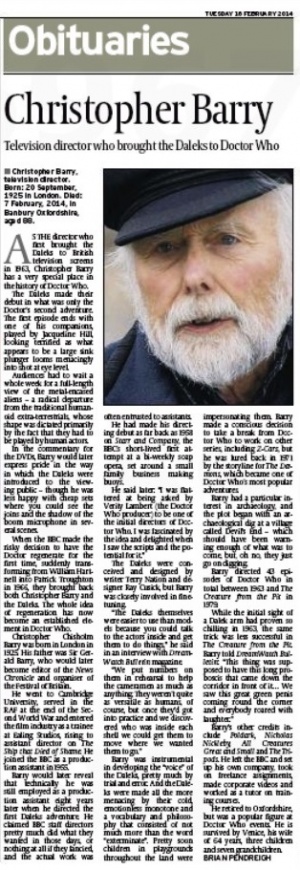Christopher Barry obituary
- Publication: The Scotsman
- Date: 2014-02-18
- Author: Brian Pendreigh
- Page: 34
- Language: English
Television director who brought the Daleks to Doctor Who
Christopher Barry, television director. born: 20 September, 1925 in London. died: 7 February, 2014, in Banbury Oxfordshire, aged 88.
As the director who first brought the Daleks to British television screens in 1963, Christopher Barry has a very special place in the history of Doctor Who.
the Daleks made their debut in what was only the Doctor's second adventure. the first episode ends with one of his companions, played by Jacqueline hill, looking terrified as what appears to be a large sink plunger looms menacingly into shot at eye level.
Audiences had to wait a whole week for a full-length view of the metal-encased aliens – a radical departure from the traditional humanoid extra-terrestrials, whose shape was dictated primarily by the fact that they had to be played by human actors.
In the commentary for the DVDs, Barry would later express pride in the way in which the Daleks were introduced to the viewing public – though he was less happy with cheap sets where you could see the joins and the shadow of the boom microphone in several scenes.
When the BBC made the risky decision to have the Doctor regenerate for the first time, suddenly transforming from William hartnell into Patrick troughton in 1966, they brought back both Christopher Barry and the Daleks. the whole idea of regeneration has now become an established element in Doctor Who.
Christopher Chisholm Barry was born in London in 1925. his father was sir Gerald Barry, who would later become editor of the News
Chronicle and organiser of the Festival of Britain.
he went to Cambridge University, served in the RAF at the end of the second World War and entered the film industry as a trainee at ealing studios, rising to assistant director on The
Ship that Died of Shame. he joined the BBC as a production assistant in 1955.
Barry would later reveal that technically he was still employed as a production assistant eight years later when he directed the first Daleks adventure. he claimed BBC staff directors pretty much did what they wanted in those days, or nothing at all if they fancied, and the actual work was often entrusted to assistants.
he had made his directing debut as far back as 1958 on Starr and Company, the BBC's short-lived first attempt at a bi-weekly soap opera, set around a small family business making buoys.
he said later: "I was flattered at being asked by Verity Lambert (the Doctor Who producer) to be one of the initial directors of Doctor Who. I was fascinated by the idea and delighted when I saw the scripts and the potential for it."
the Daleks were conceived and designed by writer terry Nation and designer Ray Cusick, but Barry was closely involved in finetuning.
"the Daleks themselves were easier to use than models because you could talk to the actors inside and get them to do things," he said in an interview with Dream-Watch Bulletin magazine. "We put numbers on them in rehearsal to help the cameramen as much as anything. they weren't quite as versatile as humans, of course, but once they'd got into practice and we discovered who was inside each shell we could get them to move where we wanted them to go."
Barry was instrumental in developing the "voice" of the Daleks, pretty much by trial and error. And the Daleks were made all the more menacing by their cold, emotionless monotone and a vocabulary and philosophy that consisted of not much more than the word "exterminate". Pretty soon children in playgrounds throughout the land were impersonating them. Barry made a conscious decision to take a break from Doctor Who to work on other series, including Z-Cars, but he was lured back in 1971 by the storyline for The Daemons, which became one of Doctor Who's most popular adventures.
Barry had a particular interest in archaeology, and the plot began with an archaeological dig at a village called Devil's end – which should have been warning enough of what was to come, but, oh no, they just go on digging.
Barry directed 43 episodes of Doctor Who in total between 1963 and The Creature from the Pit in 1979.
While the initial sight of a Dalek arm had proven so chilling in 1963, the same trick was less successful in
The Creature from the Pit. Barry told Dream Watch Bulletin: "this thing was supposed to have this long proboscis that came down the corridor in front of it… We saw this great green penis coming round the corner and everybody roared with laughter."
Barry's other credits include Poldark, Nicholas Nickleby, All Creatures
Great and Small and The Tripods. he left the BBC and set up his own company, took on freelance assignments, made corporate videos and worked as a tutor on training courses.
He retired to Oxfordshire, but was a popular figure at Doctor Who events. he is survived by Venice, his wife of 64 years, three children and seven grandchildren.
Disclaimer: These citations are created on-the-fly using primitive parsing techniques. You should double-check all citations. Send feedback to whovian@cuttingsarchive.org
- APA 6th ed.: Pendreigh, Brian (2014-02-18). Christopher Barry obituary. The Scotsman p. 34.
- MLA 7th ed.: Pendreigh, Brian. "Christopher Barry obituary." The Scotsman [add city] 2014-02-18, 34. Print.
- Chicago 15th ed.: Pendreigh, Brian. "Christopher Barry obituary." The Scotsman, edition, sec., 2014-02-18
- Turabian: Pendreigh, Brian. "Christopher Barry obituary." The Scotsman, 2014-02-18, section, 34 edition.
- Wikipedia (this article): <ref>{{cite news| title=Christopher Barry obituary | url=http://cuttingsarchive.org/index.php/Christopher_Barry_obituary | work=The Scotsman | pages=34 | date=2014-02-18 | via=Doctor Who Cuttings Archive | accessdate=20 December 2025 }}</ref>
- Wikipedia (this page): <ref>{{cite web | title=Christopher Barry obituary | url=http://cuttingsarchive.org/index.php/Christopher_Barry_obituary | work=Doctor Who Cuttings Archive | accessdate=20 December 2025}}</ref>
